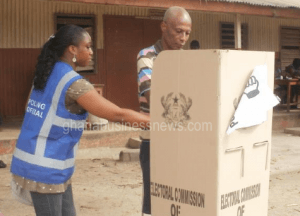EC, judiciary set for Election 2016
 The Electoral Commission (EC) on Monday said preparations towards ensuring a credible, acceptable and violence-free Election 2016 was on cause.
The Electoral Commission (EC) on Monday said preparations towards ensuring a credible, acceptable and violence-free Election 2016 was on cause.
The Commission said it had accepted and implemented some of the recommendations that were made after the Supreme Court ruling on the 2012 Presidential election towards reviewing some aspects of the electoral process, while others were still under discussion.
It said other reform processes were still on-going as part of the Commission’s preparedness towards delivering credible elections in 2016.
Mr Samuel Tettey, the Director of Elections, EC, in an address read for him at a national stakeholders’ forum in Accra, said the only aspect of the proposal the EC rejected was the “No Verification, No Vote,” which means that there should be no voting without biometric verification.
He said the Commission was of the view that the policy may disenfranchise some voters who had been properly and genuinely registered.
The forum, which was organised by the Institute of Economic Affairs (IEA), was to provide a platform for key stakeholders including the EC, the Judiciary, security agencies and the media, to present and discuss their preparations so far towards ensuring credible, acceptable and violence-free elections.
About 70 participants made up of representatives from institutions such as the various political parties, development partners, academia, civil society and the media, attended the forum which was on the theme: “Towards Credible, Acceptable and Violence-Free Elections: The Role of Key Stakeholders”.
Mr Tettey said the EC had made a lot of progress with regards to the electoral reforms that were proposed by the various stakeholders including political parties, civil society groups, religious groups, traditional rulers, organisations and individuals, and referred those outside its jurisdiction to the appropriate state institutions for consideration.
He outlined some of the preparations made as the introduction of a new Constitutional Instrument (C.I 91) on registration of voters and the conduct of elections to replace the C.I 72 to ensure continuous voter registration alongside the periodic national registration exercises.
“The Public Elections, Registration of Voters Regulation 2016, C.I 91, requires the Commission to engage with the political parties on the modalities for the implementation of continuous regulation,” and accordingly the EC developed guidelines for its implementation and made copies available to the political parties for their comments and inputs, he said.
He said progress had so far been made on the amendment of Constitutional provision in Article 112 (40) regarding the change of dates for holding Presidential and Parliamentary elections in November rather than December, saying since this fell outside the mandate of the EC it was referred to the Attorney General’s Department.
The formalisation of the IPAC meetings by the EC, the usage of biometric verification devices for the exhibition of the provisional voters register, the intention of the Commission to increase polling stations to about 29,000, to reduce the number of voters per polling station, among other things were efforts being made to ensure a free and fair elections.
The Commission, he said, had also started the procurement of materials needed for the elections especially those needed for the offshore electoral areas and updated the Biometric Voter Registration Kits and Voters Register Databse Software as part of its preparations for the Voter Registration exercise.
He said the EC continued to intensify stakeholder engagement with various institutions including security agencies, the media, women’s groups and Persons with Disability in relation to the Limited Voter Registration and to sensitise them on C.I 91.
Mr Tettey said to do away with suspicions that characterised presidential election results, the Commission recently opened tender for expression of interest for the electronic transmission of election results.
He said the Commission was prepared and committed to working with all stakeholders to ensure a credible, acceptable and violent-free electoral process which supported the peace and stability of Ghana.
Professor Justice Dennis Adjei, the Director of the Judicial Service Training Institute and a Justice of the Court of Appeal, said the Judiciary had embarked on a series of educational programmes for judges and magistrates on the new C.I 91 and other Constitutional Regulations regarding the electoral processes.
The Judiciary, he said, would update the Election Adjudication Manual to reflect the current amendments while three Supreme Court justices had been commissioned by the Chief Justice to spearhead the training of members on speedy and effective judgement of electoral offenses and petitions.
Source: GNA
